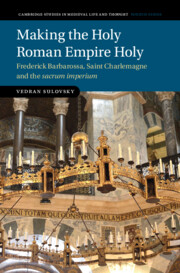 Making the Holy Roman Empire Holy
Making the Holy Roman Empire Holy Published online by Cambridge University Press: 16 May 2024
The second chapter continues the investigation of sacrum imperium, demonstrating that while the imperial chancery used the term more and more frequently, it was only the strong Italian presence at court that kept influencing the imperial notaries to use it and other correlated terms. It is also made clear that the converse was true: when there were no Italians at court, this kind of terminology was not used, even as late as the 1220s. The investigation shows, contrary to expectations, that cities where this terminology was used could be identified, and occasionally even individuals could be pinpointed. Moreover, the presence of courtiers or diplomats from the city of Rome is clearly correlated to the appearance of the tripartite title of the Empire (sacrum Romanum imperium and sacrum imperium Romanum). Thus, the most commonly used title of the Empire for most of its existence was not only invented by the Romans, as Jürgen Petersohn demonstrated, but it was also propagated by them to the rest of the Empire and the world.
To save this book to your Kindle, first ensure no-reply@cambridge.org is added to your Approved Personal Document E-mail List under your Personal Document Settings on the Manage Your Content and Devices page of your Amazon account. Then enter the ‘name’ part of your Kindle email address below. Find out more about saving to your Kindle.
Note you can select to save to either the @free.kindle.com or @kindle.com variations. ‘@free.kindle.com’ emails are free but can only be saved to your device when it is connected to wi-fi. ‘@kindle.com’ emails can be delivered even when you are not connected to wi-fi, but note that service fees apply.
Find out more about the Kindle Personal Document Service.
To save content items to your account, please confirm that you agree to abide by our usage policies. If this is the first time you use this feature, you will be asked to authorise Cambridge Core to connect with your account. Find out more about saving content to Dropbox.
To save content items to your account, please confirm that you agree to abide by our usage policies. If this is the first time you use this feature, you will be asked to authorise Cambridge Core to connect with your account. Find out more about saving content to Google Drive.